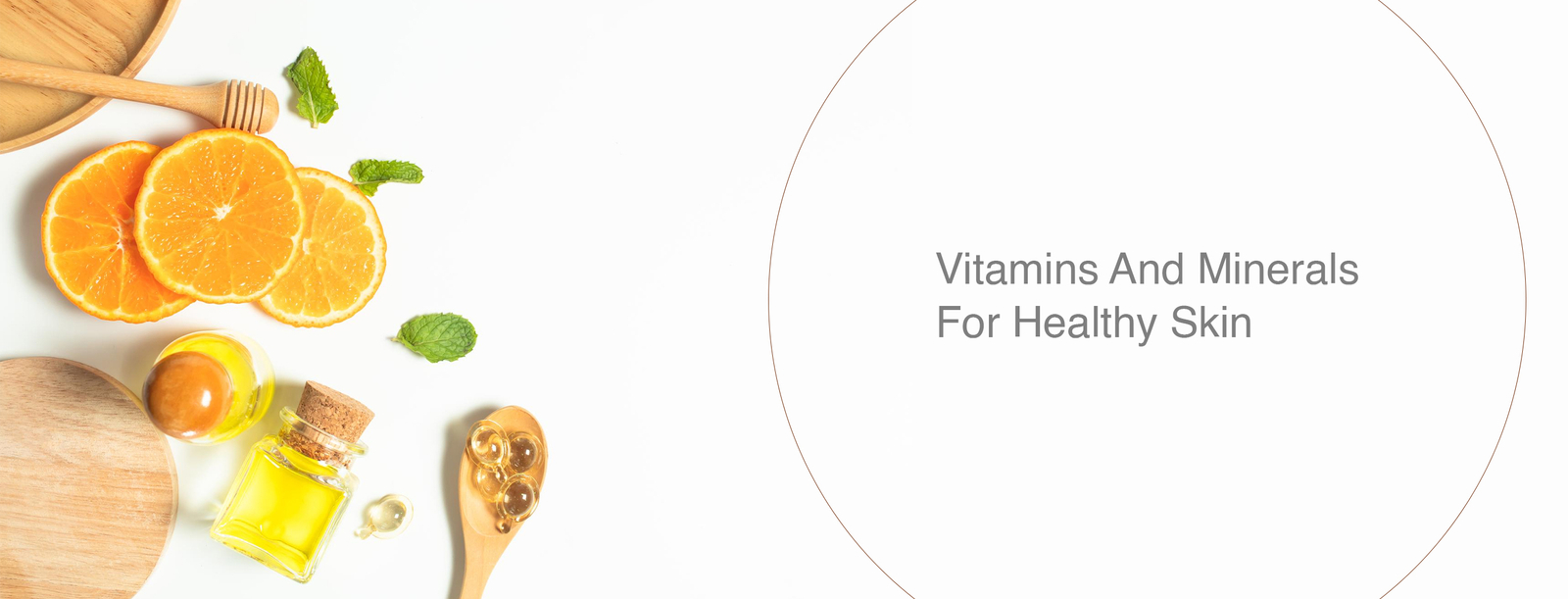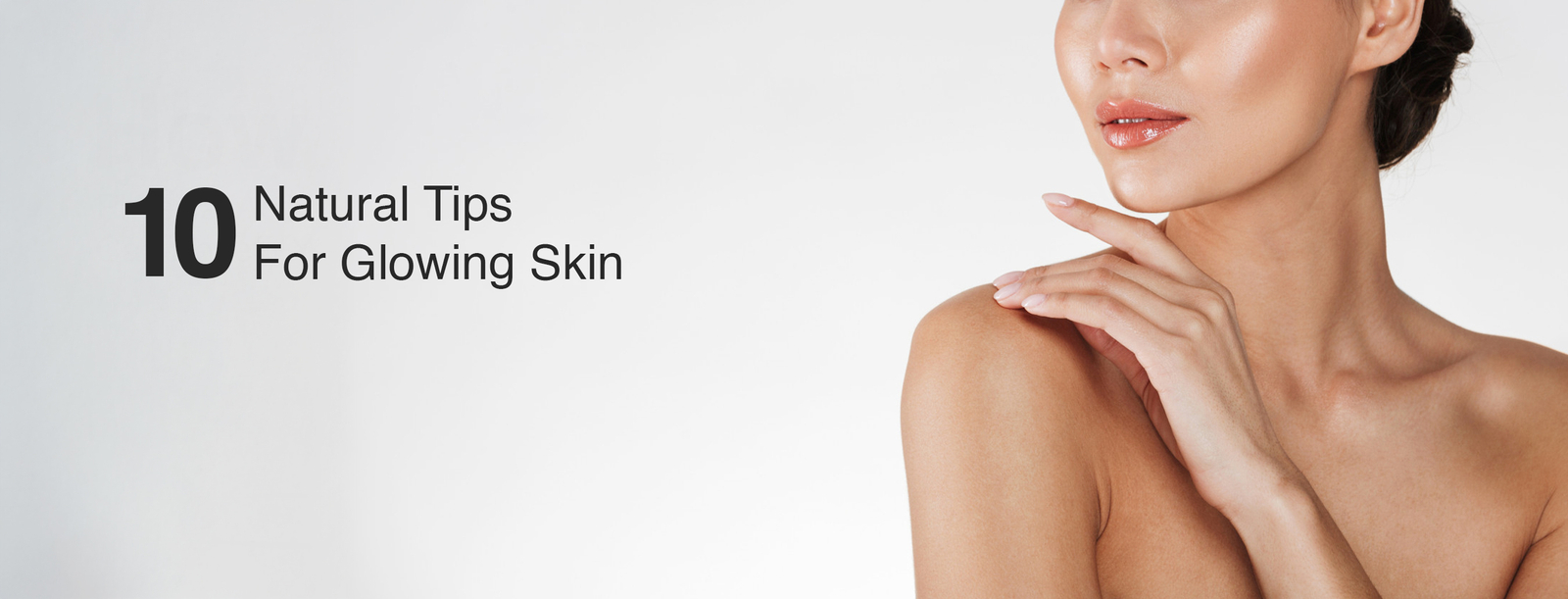Vitamins and Minerals for Healthy Skin: Essential Nutrients to Include in Your Diet
Having vitamins and minerals in your diet helps you get glowing skin. Want to know how? Read this article to know the benefits of Vitamins and Minerals for your skin.

There is no doubt that vitamins and minerals are essential
for maintaining our health. But do you know these nutrients are also good for
your skin health?
We all know that the skin is the largest and most important
part of our body. What is surprising is the important role that nutrients such
as vitamins and minerals play in maintaining our skin health. There are
different types of vitamins and minerals, ranging from Vitamin A, which helps
fight the skin's premature aging signs, to zinc, which protects your skin from
sunlight damage. “What Goes In Reflects Out.” This means that whatever we
eat/drink will directly impact our skin health.
Let's dive deep into this article to know which minerals and
vitamins are crucial for your skin. Let’s also understand how these nutrients
help rejuvenate your skin and give you the healthy and glowing complexion that
you always wished for.
Vitamins For Skin Health:
Though there are multiple vitamins ranging from vitamin A to
vitamin K and vitamin B Complex, it is always confusing to know which vitamins
work best for our skin. But the fact is that different vitamins work
differently to give you radiant skin. These vitamins are as mentioned below:
- Vitamin
A:
This fat-soluble Vitamin is one of the best foods for your
skin. It promotes skin health and reduces wrinkles, fine lines, and sagging. It
minimizes hyperpigmentation and sun damage, fights pimples and acne, and helps
treat various skin issues like psoriasis.
Animal products including meat, poultry, and dairy products
contain Retinoids, a kind of Vitamin A. Fruits and vegetables contain
ProVitamin A or Carotenoids. When you consume these, they get converted into
Retinol, a form of Vitamin A. It will be stored in your liver or used to
nourish cells throughout the body including your skin.
Carrots, pumpkin, mango, papaya, bell pepper, and liver are
food sources of Vitamin A.
- Vitamin
D:
The sun is the natural source of Vitamin D, and your body
absorbs it when you are exposed to natural sunlight in the morning. This
process converts cholesterol to Vitamin D, which is further absorbed by the
liver and kidneys and transferred throughout the body, thus creating healthy
cells.
Vitamin D is considered one of the best nutrients for the
skin, as it prevents premature ageing and maintains skin health. It is best to
spend at least 10 to 15 minutes daily in sunlight and let your skin produce
Vitamin D.
Apart from sunlight, some food sources such as breakfast
cereals and milk, sardines, tuna, and cod liver oil also provide you with
Vitamin D.
- Vitamin
C:
Vitamin C is important for both external and internal skin health. It is rich in antioxidants and acts as a collagen booster. It fights against the signs of aging, such as pigmentation, dark circles, fine lines, and wrinkles. Due to this property, Vitamin C is extensively used as the main ingredient in many anti-aging skincare products. Vitamin C also reduces cell damage and accelerates wound healing. These properties make Vitamin C an essential nutrient for our skin health.
The natural sources of Vitamin C are citrus fruits (ex:
lemon, oranges), strawberries, and capsicum.
- Vitamin
E:
Vitamin E is a powerful antioxidant that benefits your skin.
Its main function is to protect your skin from the harmful ultraviolet rays of
the sun. It absorbs the damage-causing ultraviolet rays and boosts
photoprotection. It also minimizes the possible risk of wrinkles and dark
spots.
It also complements the natural production of Sebum, a
natural oily substance produced in our body, and helps in maintaining skin
health. It even prevents dryness and inflammation thus making it an essential
ingredient in any skincare product.
Almonds, sunflower seeds, peanuts, walnuts, spinach, and ivy
gourd are some of the sources of Vitamin E.
- Vitamin
K:
This Vitamin plays an important role in blood clotting. It
also reduces dark circles and bruising of the skin by strengthening the walls
of blood vessels and capillaries. These strengthened blood vessels stop the
leakage of blood, which causes bruising under the eyes and skin discolouration.
The anti-inflammatory properties of Vitamin K help to prevent the redness and
irritation of the skin.
- Vitamin
B7 Or Biotin:
Biotin also referred to as Vitamin B7, helps in promoting
and maintaining the growth of skin, hair, and nail tissues and promotes keratin
production. (Keratin is a protein that is present in hair, skin, and nails).
Many skincare products and haircare supplements contain Biotin in them. It
increases skin hydration and the production of ceramides - lipids that help
maintain the skin barrier. It also reduces inflammation and reduces the
appearance of wrinkles and fine lines. You can apply biotin-rich skincare products,
take biotin supplements, or through dietary sources like eggs, nuts, and green
leafy vegetables,
- Niacin
Or Vitamin B3:
Niacin or Vitamin B3 is a water-soluble Vitamin that acts as
a natural skin barrier. It strengthens the skin by producing ceramides -
essential lipids that keep your skin well-hydrated and protected. It also
brightens your skin by reducing hyperpigmentation, skin tags, and aging marks.
It maintains an even tone and radiance to your skin. Niacin also reduces
inflammation and redness in the skin.
- Pantothenic
Acid or Vitamin B5:
This Vitamin is a component of coenzyme A that produces
Sebum, a natural skin oil. It keeps your skin moisturized and reduces dryness
and flaking of the skin. The inflammatory properties of this Vitamin reduce
redness and skin irritation. It is a useful ingredient used in many skincare
products, especially for those with sensitive or acne-prone skin.
Minerals for Skin Health:
Just like Vitamins, minerals also help in providing good
health to your skin. You can get these minerals naturally from your food.
- Zinc:
Zinc has antioxidant properties and is believed to help your
skin prevent the damage caused by UV rays. It also heals your wounds quickly.
The deficiency of zinc will cause acne and pimples, thus making it one of the
essential foods for skin health.
Sources of Zinc are soybeans, almonds, gingelly seeds,
garden cress seeds, flax seeds, and sunflower seeds.
- Selenium:
Anti-ageing properties of Selenium protect you from
age-related skin issues. It also saves your skin from harmful UV rays and
oxidative stress.
Foods such as fish (mackerel, catfish, mullet, and Bombay
duck), meat (lamb and turkey), and millets (samai, bajram, jowar, and amaranth)
are rich sources of Selenium.
- Magnesium:
Magnesium is an essential mineral that fights inflammation
and premature ageing. Magnesium also promotes skin hydration.
Sources of Magnesium are eggs, avocado, sunflower seeds,
bananas, lentils, cashews, and green leafy vegetables.
- Iron:
Iron strengthens your skin and improves the elasticity of
the skin by producing collagen. It plays an important role in oxygenating skin
cells, promoting healthy blood flow to the skin, and reducing anaemia, which
causes paleness and dullness of the skin.
An iron-rich balanced diet containing red meat, poultry,
seafood, beans, and green leafy vegetables helps maintain healthy and glowing
skin.
- Manganese:
Antioxidant properties of Manganese protect your skin from
damage caused by free radicals. It heals wounds quickly, protects your skin
from the harmful effects of UV rays, and has anti-inflammatory properties that
reduce acne.
Note: Consult a healthcare professional before you make any
dietary changes as too much consumption of these Vitamins and Minerals may harm
you more rather than make good.
Final Thoughts:
Providing your skin with essential Vitamins and Minerals
will make it glow, and keep it fresh, healthy, and rejuvenated. Having a diet
including fruits, vegetables, whole grains, legumes, nuts, and lean proteins
will provide your skin with the necessary Vitamins and Minerals.
In addition to this, drinking plenty of water
throughout the day will keep your skin well-hydrated. Maintaining these steps
will ensure the long-term benefit of having beautiful and glowing skin
throughout the year.









